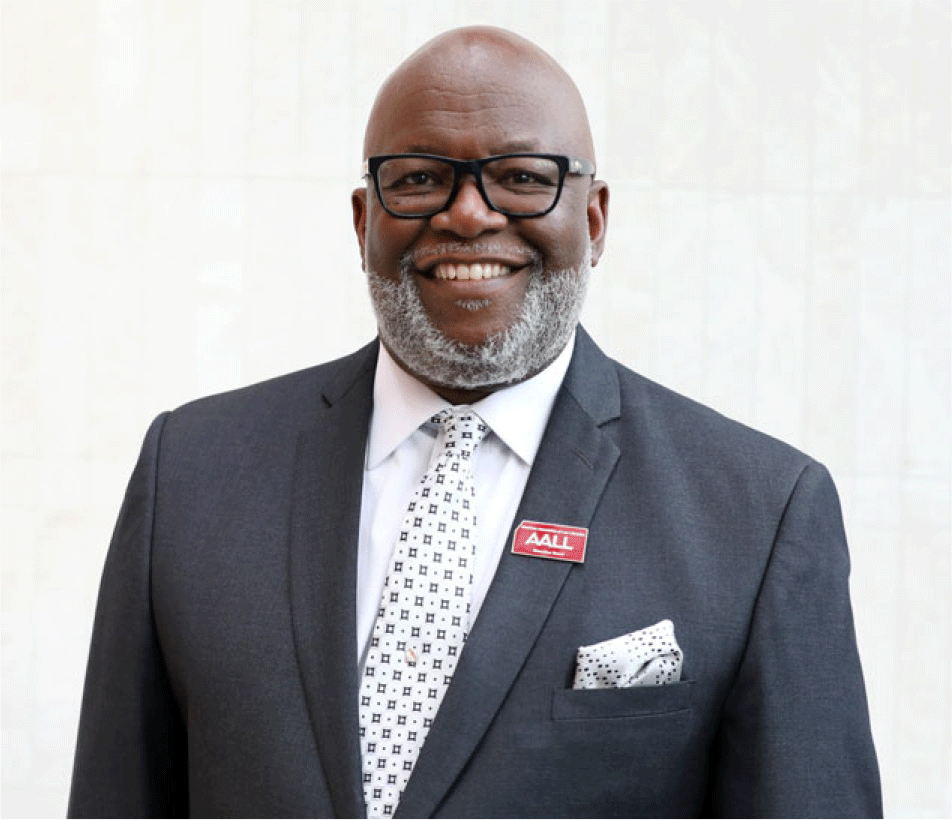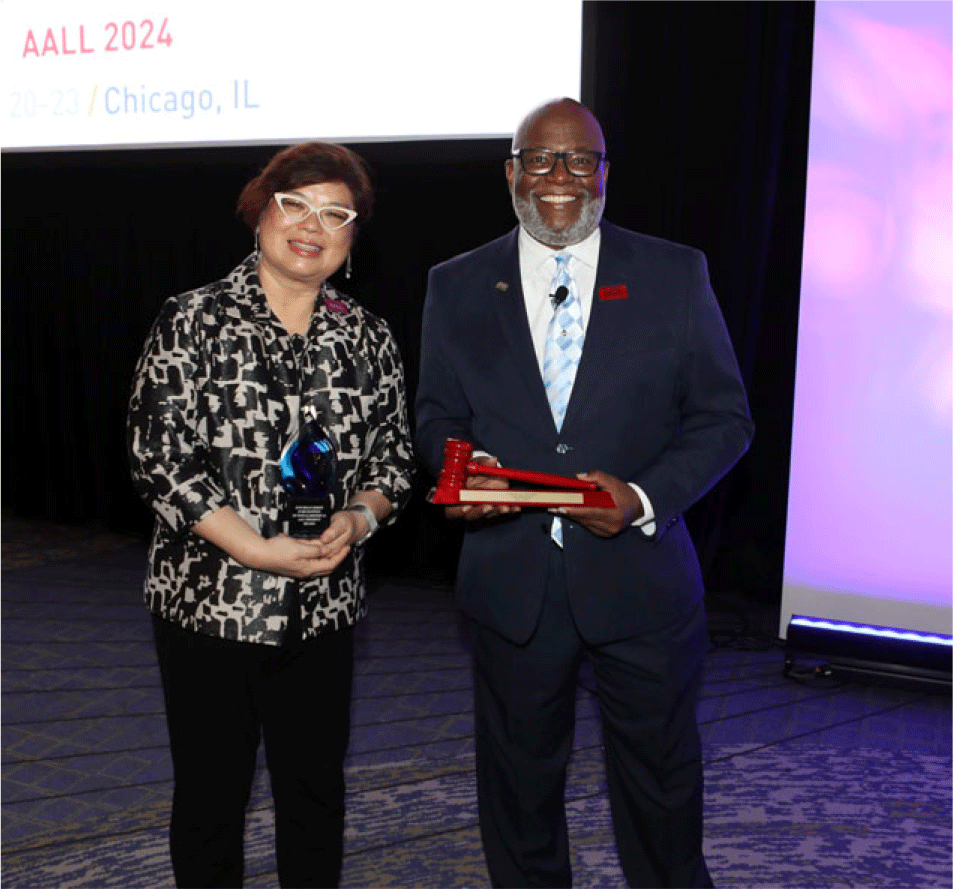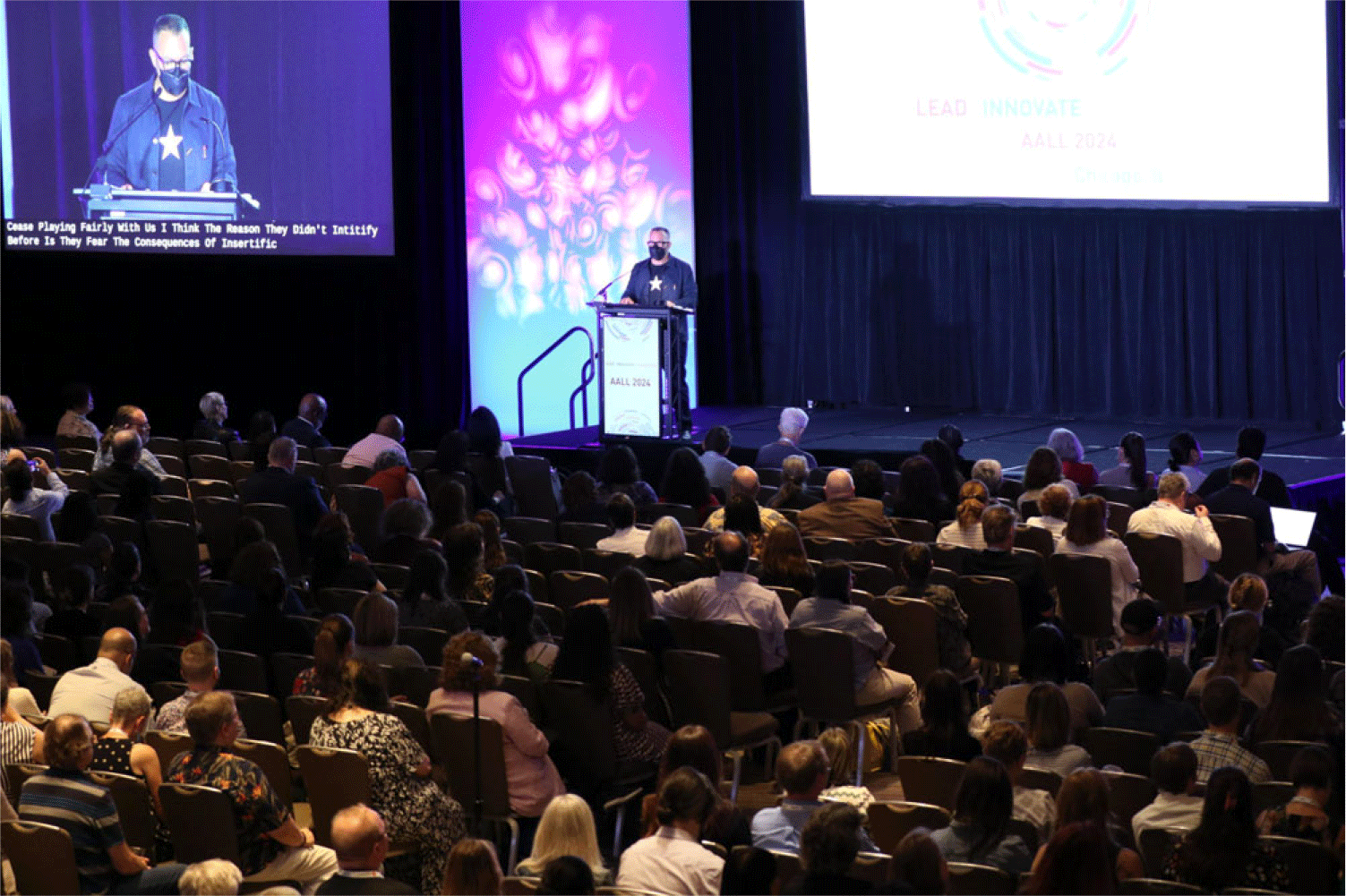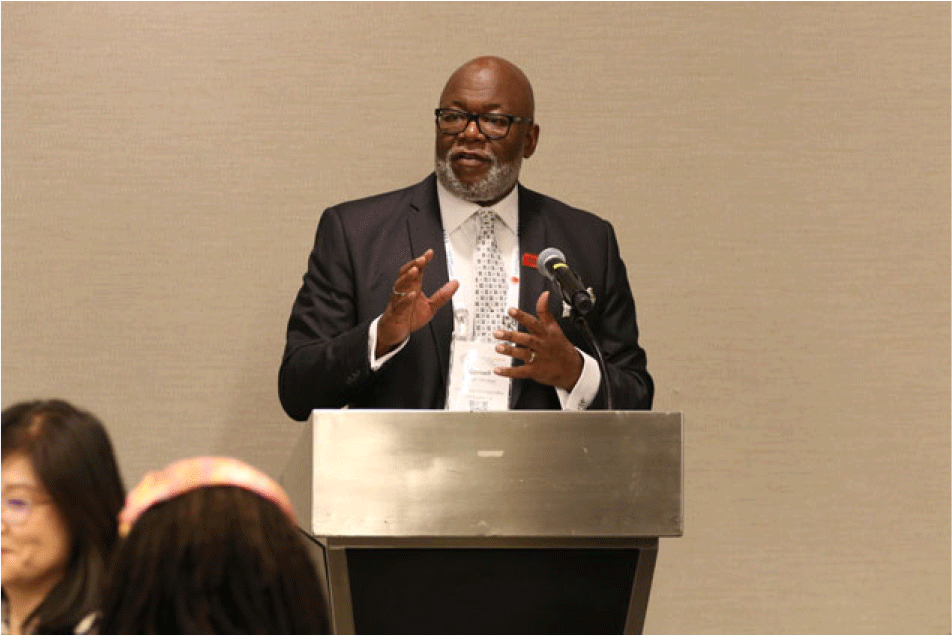
Cornell Winston, President of the American Association of Law Libraries
It’s a pity when a really great word is overused so much that its impact is diminished, especially when it’s used incorrectly. There was a time, for instance, when ‘awesome’ was used to describe something that filled one with awe, and not just a good oatmeal latte. The same goes for ‘passionate’; if you were passionate about something it used to really mean something, but now it’s on every CV, or résumé, in the world. Which makes it difficult to put across just how passionate Cornell H Winston, President of the American Association of Law Libraries (AALL), is about his work and his role in the US legal information organisation. In fact, we may need a new word …
That passion for all things to do with the legal information world was first ignited almost by accident, while he was studying history at university. “I came to the profession in a non-traditional manner,” Cornell says. “As an undergraduate, many years ago, I got a job as a student worker at a county hospital library, and I liked it. It was fun. It was interesting. I’ll admit, I’ve got a little bit of a ghoulish nature! So, some of the medical journals and books, I would just look through them because it was just so interesting, how they did surgery.
“When I graduated college, like many 22-year-olds I wasn’t sure what I wanted to do,” Cornell adds. “I thought I wanted to do one thing, but that didn’t pan out, but then a job as a circulation supervisor at the hospital library opened up, and I got it.”
Cornell then went on to work as a circulation supervisor at the now-defunct Whittier Law School, before finding law librarian roles at a couple of law firms, and then landing up where he is now, the US Attorneys’ Office, 23 years ago.
And it’s a post he clearly loves. “It is always interesting,” he says. “For example, when I started, we were doing work on identity theft. This was back in 2002, 2003. And even now I still do a lot of research in that area, because our office does community outreach, and things have changed in that area so dramatically. And that’s one of the things that we do, outreach, especially to high schools. And we have to, because kids don’t realise, when they post something it’s there forever. And sometimes the information that is revealed, it puts those children in danger. And that is a real danger. When I get projects like that, or when I get projects where I’m interviewing an expert witness, trying to find information, the sleuth in me comes out.”
Cornell also enjoys working with lawyers. “I gratefully say I am not an attorney, but I help the attorneys do their job. And that is so rewarding.”
SEEING THE LIGHT
Also rewarding, Cornell says, is the work he does as President of the American Association of Law Libraries (AALL), a body he first joined over 30 years ago. “I joined AALL in 1992, the annual meeting [conference] was in San Francisco and the law firm that I had started at earlier that year was headquartered there. The head librarian said she wanted all the librarians to come to San Francisco for the meeting, and you had to join AALL.
“So I joined, and it was like, oh man! Sometimes, if it’s dark inside your house and you open the blinds, all of a sudden the light just floods in. And that’s what it was like for me, my first AALL. The sunlight came in, and it was: I’m in the midst of my people! People who understand when you talk librarian talk! Here you can converse and learn. I had such a fabulous annual meeting.
“From there, in 1998 I believe it was, the annual meeting was in Anaheim, in the Los Angeles area,” Cornell adds. “We had a closing banquet, and I was in charge of it. I love parties. The banquet went well, and from there I was put on another committee and another committee, and then I was asked to run for the board.”

Cornell Winston with AALL Immediate Past President June Hsiao Liebert
Cornell was elected Treasurer in 2019 and then, in 2022, he was put up for President of AALL. “I was one of the two candidates for the position of President, and the membership elected me,” he says. “And it’s been a rewarding experience. It’s just been great. It’s really been fabulous.”
Yet although Cornell is clearly enjoying his time as President, this does not mean the post is not without its challenges. “There are several,” he says. “Number one, I think, is how do we keep people engaged? How do we make sure that what we’re providing as an association is meeting the needs of our membership? The thing about AALL is we have individuals in academia, in private law firms, in government law libraries that are closed to the public, government law libraries that are open to the public. And it’s a juggling act to make sure all these people’s needs are met.
“Also, I think one of the other challenges we have is that there are so many changes going on in these times,” Cornell adds. “How do we remain relevant? Younger individuals, many of them don’t see the need for associations. But I think one of the worst things is that you try to be a lone wolf, as the lone wolf will eventually starve.”
Cornell is also responsible for ensuring AALL stays in good shape. “We also have to make sure that our revenue sources are diverse, that we don’t depend on one thing, because we found out, like many associations unfortunately, when we had the pandemic meetings got cancelled, programmes were scaled back. And many associations are really struggling right now. And that’s unfortunate. And I think much of it can be tied back to the pandemic. So, we have to make sure we remain financially strong for the future. It’s a hard task, that’s for sure.”
Another challenge that’s linked to the pandemic is finding volunteers to fill roles within AALL, Cornell says. “People didn’t volunteer during the pandemic. I’m glad that in the last few years, we’ve had increasing volunteerism. AALL is larger than most other associations, and at any given time there are about 300 slots between our standing committee and our juries that have to be filled.
“Some people have the misconception that, ‘Oh, this is just going to take forever if I volunteer’. But that’s really not the case. Sometimes, with the juries, you’re over in a couple of weeks. Others are longer. But all told, it’s good. And I’m glad volunteering is increasing. People, I think, really are now becoming more engaged with the association.”
One method which Cornell uses to get people to volunteer is what he calls ‘voluntold’. “The one thing I find, is that people may not volunteer if you put out a call for volunteers. But if there’s open slots and you think, ‘I know someone who would be perfect for that’, you call them up and say, ‘I really need you to do this’. They say, ‘okay, I’ll do it’. And that’s why sometimes you get voluntold.”
The point with voluntolding is that often people do not appreciate that they are perfect for a position. “People don’t realise they know more than they think they know,” says Cornell. “Their contribution is more than they think it is. And it’s telling them: ‘You’re an expert, you’re a professional in this field’.”
PEOPLE PERSON
Talk to Cornell for just a few minutes about his position as President of AALL and you will be left in doubt that he loves it, and the main reason for this is not so very surprising. “It is really the people,” he says. “Since I’ve been Vice President, then President, I’ve gone on several chapter visits. I’ve met individuals at meetings with other associations and organisations we’ve partnered with. And the people make the difference. You learn from others, you see what they do. You get your bank of knowledge from other individuals. It has been a great experience, even with some of the challenges that we have had to face. It’s been great. I am so grateful and thankful for the membership for allowing me this honour, to be President, just to meet individuals and talk to them, and especially younger librarians.
“We have a meeting at the Conference, we call it the Conference of Newer Law Librarians, CONELL, and it introduces new people to the association,” Cornell adds. “Being on the board, I’ve always gone to this. Just being able to go and talk and see these bright faces and these budding individuals, it brings to mind when I attended my first meeting in ’92.”
There are some tougher, and even some more mundane, tasks associated with being President of an organisation like AALL, though. “We had to work on some of our archives, and we have been trying to deal with these things for about eight years,” Cornell says. “It was my duty, so I just said, ‘I’m going to get this done this year, by October 1st [2024], the new fiscal year, this will be done’. And it was done, and I’m happy about that.
“The other thing we’re working on is our strategic plan for 2025 to 2028,” Cornell adds. “To make sure that we have direction for what we’re doing, and to make sure our programmes can be funded. A lot of us have grand ideas, but minimal money. So we have to make sure what we do is in line with our strategic directions. Our strategic directions from 2022 to ’25, we’ve done well on those.”
There are also AALL training programmes to continue with and, as is the case with BIALL, much of this is now delivered over the internet. “We do a lot of things online. I remember when I joined the association, essentially, you had to come to the annual meeting to get the most out of your continuing education. But now we have monthly webinars and coffee chats. And we need to make sure those things are meeting the needs of our membership. I’m really pleased about our ongoing education.
“Also, our annual meeting in Portland [in July] is moving forward. Our finances seem to be in line. I’m not going to say things are going really great. I’m not going to say that. But I’m going to say, ‘okay, if they stay this way until July, I’m going to be really happy’.”
Also happy will be the very many AALL members, a group that is actually growing. “It is increasing,” says Cornell. “Last count, I think we had about 3700 members and we’ve had a good retention rate. Things dipped, during the pandemic, like most associations, and some didn’t renew, but we’ve done pretty good. And I think people who got unengaged during the pandemic know that we’re still here. So it’s, come on, come on back and engage with your colleagues.”

AALL Conference, or annual meeting, attendance has been very good in recent times. Here Cory Doctorow delivers the keynote speech
Part of the reason for this increase in the membership is that AALL is very much looking beyond the word ‘librarian’ when it reaches out to people. “The way we have marketed ourselves has helped,” says Cornell. “I know in America, a librarian means one thing. But now with many of our members, it’s a ‘librarian’, it’s ‘knowledge manager’, it’s ‘resource specialist’, it’s ‘information specialist’. We’re reaching out, reaching out into so many areas for our membership.
“We had two cancelled annual meetings, in 2020 and 2021, but ’22, ’23, our attendance has increased,” Cornell adds. “And last year we maxed out on the number of CONELL participants. We had over 100 in Chicago last year. We just have to make sure that we keep reaching those individuals that may not have librarian in their title, but that’s the work they do. You’re librarians. You may call yourself a knowledge manager or information specialist, but it’s the same skillset.”
But of course, that skillset is also rapidly evolving, largely because of the introduction of new technologies, such as AI, and Cornell is very much up for the challenge this is bringing to the profession. “It’s something that’s there,” he says. “It’s something that we face. My age is going to show now, but I remember 20 plus years ago when the Internet came out, and it was, ‘oh, my gosh, what is W.W.W.’ It was a little scary. But the librarians were saying, we’ve done this all our lives. This is our profession. So I think the one thing with AI is that we’re going to have to own it, and help individuals navigate through it. I know last year at our annual meeting, there were several programmes on AI that were well-attended. For the meeting in Portland in July there are other programmes with AI, because when you think you have your finger on it, the ball moves.
“AI is out there, it’s going to change how we work, how we research,” Cornell adds. “But the one thing I do notice with AI is, like the line with Google, it may give you a million answers, but it takes a librarian to give you the right answer. AI could give you some answers, but you still have to verify those answers. Other things with AI, like how it can do a synopsis of an article, that can help you. Those things are the good things.
“Will AI replace us? Many people do fear that. But I don’t think so. I think, as librarians, that we have to marshal those resources and utilise them to our advantage, and also teach other individuals how they could use them.”
GLOBAL VIEW
Of course, AI is not just an issue in the US, all of the law library associations across the world will need to deal with it, which means working together to a certain extent. With this in mind, Cornell is keen to further develop AALL’s relationship with BIALL, especially after having had “a grand time” at the Conference in Leeds last year, which he visited as Vice President of AALL.
“With BIALL, we can help one another in whatever area that we need to,” Cornell says. “Sometimes it just helps to have a colleague in a sister association that you can call and say, ‘let me ask you a question. We’re dealing with this. How do you deal with it?’ Or ‘is that something that you’re facing?’”
Being successful as an association is also about how people face the future, and for AALL’s annual meeting this year Cornell has chosen the slogan ‘To be Bold’, which ties in nicely with what he sees as one of the main challenges facing the profession right now. “I think one of the challenges is how librarians are viewed,” he says. “Some people, when they say ‘library’, they think of bricks and mortar with a person, and we’re the keeper of books. But in the 23 years I’ve been at the US Attorneys’ Office, my library space has shrunk, shrunk, shrunk. But the work I do has expanded, expanded, expanded. And I think that’s the challenge, that you say ‘we can’t be seen as the keeper of books, really we’re the masters of knowledge’.”
And the nature of that knowledge might not necessarily be legal. “For me, when I started in this profession, I got legal questions,” Cornell says. “Do a legislative history on a statute. What’s the case that I have to find? Now I may get a medical question, a psychology question, and you think it has nothing to do with the law, but it’s something that’s there. For example, the research that I do on expert witnesses; it’s where are they published, what other cases have they worked on?”
The important thing, of course, is to find the information that’s needed, and Cornell has a nice take on why it’s vital not to let down the people who are relying on you to do just this. “The first law firm I worked for, they had a saying, and they still have it. It’s that the best source of new business is the business that’s currently on your desk. I always remember that as a librarian, the best source of marketing for the library is the question that they’re asking right now. Because when you do it well, they gain an appreciation that you’re an expert.”
Cornell speaks from great experience on this and other points, as he started his first law library job on April 15th, 1980, a date that’s inscribed in his memory. It’s this vast experience that makes him such a great source of information and guidance for those coming to the profession for the first time, and there’s one piece of advice he will always give to such people. “The one thing I always tell people, connect with your colleagues,” he says. “You will always go wrong isolating yourself from professionals who understand what you do, those who do what you do.
“When I got the job as the law librarian at the Los Angeles office of Orrick, Herrington & Sutcliffe, there were three other law firms in our building with magnificent librarians,” Cornell adds. “I was young and dumb, but they were seasoned, yet they never refused my call. They never said, ‘I’m tired of you asking me these questions.’ They really mentored me, without being professional mentors, but your colleagues are the same. So, I say, if you’re new, reach out to somebody and learn as much from your colleagues as you can.”
ALL IN AALL
Working in the US right now means there are a number of challenges that AALL has to face, including shifting views on diversity and inclusion. “DEI is a continuing commitment,” Cornell says. “It is a continuing commitment because I know, here in America, unfortunately, there are individuals, there are companies, organisations, pulling back on this. But we have been committed to diversity for many years. It’s part of our strategic goals. Our largest scholarship is dedicated to minorities trying to enter the profession. I think part of it is to say, ‘we’re here to support you in your journey’. I think one of the most important things is that people see a face. They see your diverse face, whether it’s your ethnicity, your gender. They see you and they say, ‘I could do that’. I know when I joined AALL there were very few African Americans. But quite frankly, I think once you get in, you realise people really don’t care who you are. If you have blue hair, it’s ‘Hey, you can do the job. You’re great. We’re really lucky to have you in our organisation’.
“But we have to remain committed,” Cornell adds. “We’re not saying, ‘well, I’m choosing you over another person’. Really, it’s just, ‘listen, this is a big door, and more than one person can go through this door’. But most of all, as you enter, you will have colleagues; colleagues that support you, that encourage you, that mentor you, so that you can leave the door open for someone that comes in behind you.”

Cornell, pictured speaking at a leadership lunch, is optimistic about the future of the profession but believes librarians will need to evolve to meet the challenges it will bring
Cornell is certainly optimistic about the drive for greater diversity in the industry, but then he’s a very optimistic person full stop, and his views on the future of the profession as a whole bear this out. “We’re evolving. Each turn brings something new. Our titles may change. Our physical space may shrink. But our core mission really remains the same: to empower the legal profession with knowledge and expertise. Our world is more complex. The legal profession is more complex, and we have to evolve to meet the changes.
“I think the future is great. I really do. Sometimes I’ve read these things about a dying profession. No, we’re not dying. We are not even on life support. We’re not even in the emergency room. No, we’re out on the front lines doing more, I think, than we’ve ever done before.
“I think for all librarians, it’s like we’re here, we’re the professionals, we’re here to help. We’re here to monitor these things. And I really do look forward to that. I’m one who is not going into the next five years scared.”
What was that word discussed at the start of this piece? Passionate.


